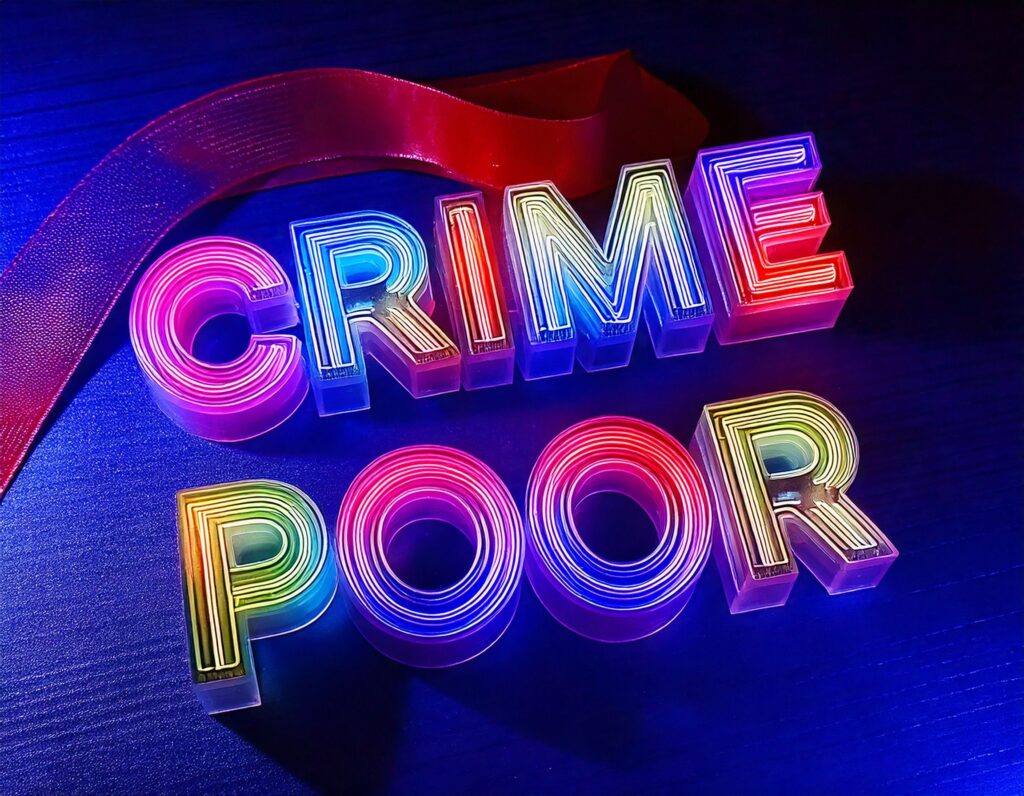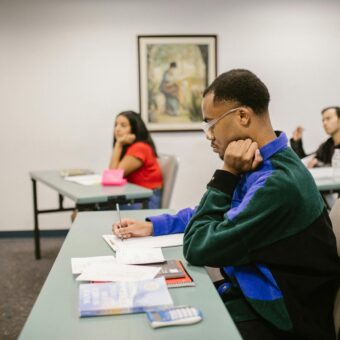
By Jennifer Kent, Counselling Lecturer, FSB Leicester
In the United Kingdom, 2 in 10 adults are in poverty, with 126,040 households considered homeless in England (Joseph Rowntree Foundation, 2025; Shelter, 2025). Monetary sanctions and the fines and fees that disproportionately target the poor challenge the notion of fairness and equality. The criminalisation of poverty is a tireless social issue, where criminal prosecution disproportionately affects impoverished people (Edelman, 2018).
The historical roots of targeting the poor were codified within the Vagrancy Act 1824 and are something we still encounter today, with fines such as unpaid TV licenses, parking tickets, and the attachment of criminal sanctions to situations which inevitably result in unequal punishment of the poor (Behan and Stark, 2023). These fees seek to continually criminalise the disadvantaged for their inability to meet financial obligations that wealthier individuals view as minor inconveniences. This article will discuss the historical relevance of the Vagrancy Act, its implementation today and the ongoing impact of policies that criminalise poverty.
Historical Context: The Criminalisation of Poverty
The roots of criminalising poverty stretch back to medieval Europe, where the homeless and unemployed were punished harshly. The “Poor Laws” of 16th-century England exemplified this, imposing penalties such as whipping or imprisonment for those unable to find work (Davies, 1966). The poor were viewed as dangerous to public order rather than victims of economic misfortune, resulting in this mentality becoming enshrined in laws that conflated poverty with criminality, some of which are still in place today.
One of the most significant legacies of this era is the Vagrancy Act of 1824, a British law aimed at controlling the poor. Passed during a time of social upheaval, the Act made it a criminal offense to beg, sleep in public places, or wander without visible means of subsistence (Vagrancy Act, 1824). The law allowed authorities to arrest people merely for being poor or homeless, further marginalising an already vulnerable population. Astonishingly, some sections of the Vagrancy Act remain in effect in parts of the UK today, enabling the criminalisation of behaviours that stem from poverty.
The Vagrancy Act of 1824: A Law Still in Effect
Despite being nearly two centuries old, the Vagrancy Act remains part of the legal framework in the UK. Although large parts of the Act have been repealed, there are still sections which remain on the statute book for England, Wales and Northern Ireland. One of these sections states:
‘Every person wandering abroad, or placing himself or herself in any public place, street, highway, court, or passage, to beg or gather alms, or causing or procuring or encouraging any child or children so to do; shall be deemed an idle and disorderly person within the true intent and meaning of this Act […](Vagrancy Act, 1824)’
The law allows authorities to arrest individuals for “vagrancy” or “being in a public place to beg,” which disproportionately impacts the homeless. While there have been calls for its repeal in recent years, the Act’s continued presence underscores the lingering stigma against the poor in legal systems. Although reforms have reduced the severity of the Act’s application, the idea that the poor and homeless represent a social threat continues to shape policing practices, especially in urban areas. Instead of addressing the root causes of poverty and homelessness, such laws entrench them further by creating additional legal and financial barriers for those struggling to survive.
Modern-Day Criminalisation: The Perpetuation of Inequality
In the modern era, the criminalisation of poverty manifests in subtler ways, yet the impact on low-income individuals remains substantial. Two significant examples of how poverty is criminalised in contemporary society are parking fines and TV licensing fees. The inability to pay small parking fines can have catastrophic consequences such as escalating penalties, license suspensions and, sometimes, arrest warrants. Those in a lower socioeconomic class, who are unable to pay such fines, often finds themselves trapped in the perpetual cycle of mounting debt and legal consequences.
TV licensing fees are another example of how the criminalisation of poverty persists in the modern day. In the UK, failing to pay for a TV license – a mandatory fee for watching live television or BBC programs – can result in fines and, in some cases, legal action. When lower-income households fall behind on their payments, they face fines and court appearances that can deepen financial distress. In 2022, there were 44,245 prosecutions and 40,654 convictions for TV Licence evasion (Zayed, 2024).
Both parking fines and TV licensing fees illustrate the broader problem of how fines and fees are used to extract money from those least able to pay. These penalties needlessly affect low-income individuals, creating a system that perpetuates inequality. What starts as a small financial penalty can escalate into a cycle of debt, leading to further legal consequences, such as arrest warrants or incarceration.
Proposed Solutions: A Path Toward Justice
To combat the criminalisation of poverty, several steps need to be taken:
- Repealing Punitive Laws: Outdated laws such as the Vagrancy Act of 1824 should be repealed, and governments should eliminate the criminalisation of poverty-related behaviours like begging, loitering, and sleeping in public spaces. This would prevent the formal punishment of individuals for circumstances beyond their control. In 2023, a repeal of the Vagrancy Act was proposed, and the Criminal Justice Bill was introduced as its replacement. While this might seem like a step in the right direction, the Criminal Justice Bill is strikingly similar to the Vagrancy Act, allowing police to respond to begging and rough sleeping, which can lead to individuals receiving a 1-month imprisonment sentence and/or up to £2,500 fine (Watkins, 2024). As of writing this, sections of the Vagrancy Act are in force in the UK and there has been no confirmation date for the official introduction of the Criminal Justice Bill as its replacement.
- Expansion of Social Services: To address the systemic link between poverty and crime, investment in social policies that reduce inequality is essential. Social policies should seek to reduce poverty by investing in education and skill development programmes to equip individuals with the knowledge needed to gain employment and become contributing members of society. High-quality education has been positively linked with increased social mobility and opportunities, lowering the likelihood of those from lower socioeconomic backgrounds engaging in criminal activities (Jones, 2022; Mian, 2023). Expansion of other social policies related to employment, mental health, community development, and housing, as well as providing an integrated service delivery model, focused on collaboration, communication and coordination, is necessary to break the cycle of poverty and prevent the criminalisation of those who are most vulnerable.
- End Imprisonment for Non-payment: Imprisonment should be scrapped for non-payment of civil debt – i.e. TV license and parking fines. It is necessary to consider the intergenerational impact of parental imprisonment on children when contemplating the costs of sentencing. The Ministry of Justice (2024) found that an estimated 78% of the prisoner population has children below the age of 18. Research has shown that children of prisoners are at significantly more risk of negative outcomes, such as future offending, mental health issues, and educational impacts, than children not affected by parental imprisonment (Murray & Farrington, 2008). These outcomes perpetuate the cycle of inequality and criminality within society.
Toward a More Just Society
The criminalisation of poverty is a deeply ingrained issue that affects millions of people worldwide. Whether through outdated laws like the Vagrancy Act of 1824, or modern mechanisms such as parking fines and TV licenses, the poor are disproportionately penalised for their lack of resources. A proactive and multidisciplinary approach is necessary to address the inequality and unjust criminalisation of the poor.
References:
Behan, C. and Stark, A. (2023). Who Is Punished? In Prisons and Imprisonment: An Introduction (pp. 51-72). Cham: Springer International Publishing.
Davies, C.S. (1966). Slavery and protector Somerset; the vagrancy act of 1547. The Economic History Review, 19(3), pp.533-549.
Edelman, P. (2018). The criminalization of poverty and the people who fight back. Geo. J. on Poverty L. & Pol’y, 26, p.213.
Jones, S.C. (2022). Education and the social mobility conundrum: An examination of the ‘psychosocial and academic trust alienation theory’ in the context of disadvantaged students in the UK secondary education sector. Wiley Online Library. 38(1), pp, 137-158.
Joseph Rowntree Foundation. (2025). UK Poverty 2025 [Online]. Available at: UK Poverty 2025: The essential guide to understanding poverty in the UK | Joseph Rowntree Foundation [Accessed: 12 March 2025].
Mian, L. (2023) The Role of Education in Promoting Social Mobility. Sociology and Criminology: Open Access. 11(2).
Ministry of Justice. (2024). Official Statistics in Development: Estimates of children with a parent in prison. Available at: https://www.gov.uk/government/statistics/estimates-of-children-with-a-parent-in-prison/official-statistics-in-development-estimates-of-children-with-a-parent-in-prison (Accessed: 24th March 2025).
Murray, J. and Farrington, D.P. (2008). The effects of parental imprisonment on children. Crime and justice, 37(1), pp.133-206.
Shelter. (2025). Children in temporary accommodation hits another shameful record as rough sleeping soars [Online]. Available at: Children in TA hits another shameful record as rough sleeping soars – Shelter England [Accessed: 17 March 2025]
Vagrancy Act 1824, c. 83. Available at: https://www.legislation.gov.uk/ukpga/Geo4/5/83/section/3
Watkins, E. (2024) The Criminalisation of Poverty: Past and Present. [Online] Available at: The criminalisation of poverty: Past & Present – Is it a Crime to be Poor? [Accessed: 24th March 2025].
Zayed, Y. (2024). TV Licence Fee Statistics (House of Commons Library Briefing Paper 8101). CBP-8101.pdf
